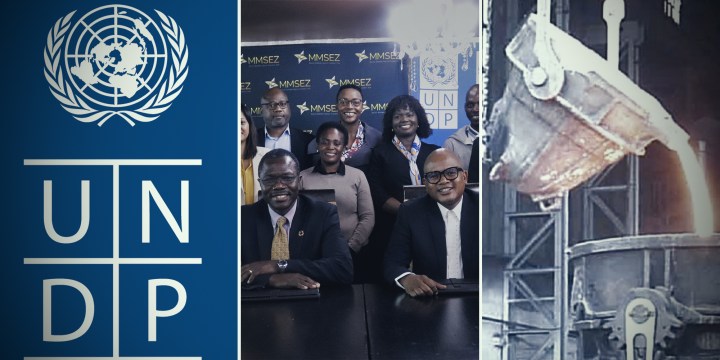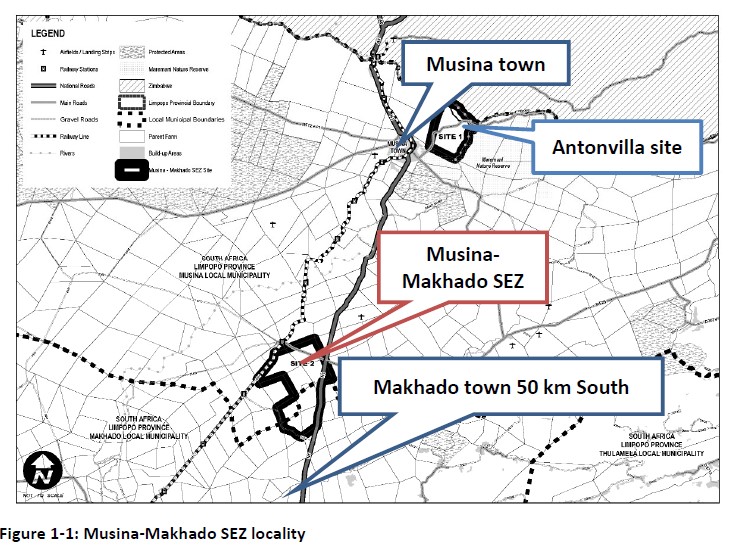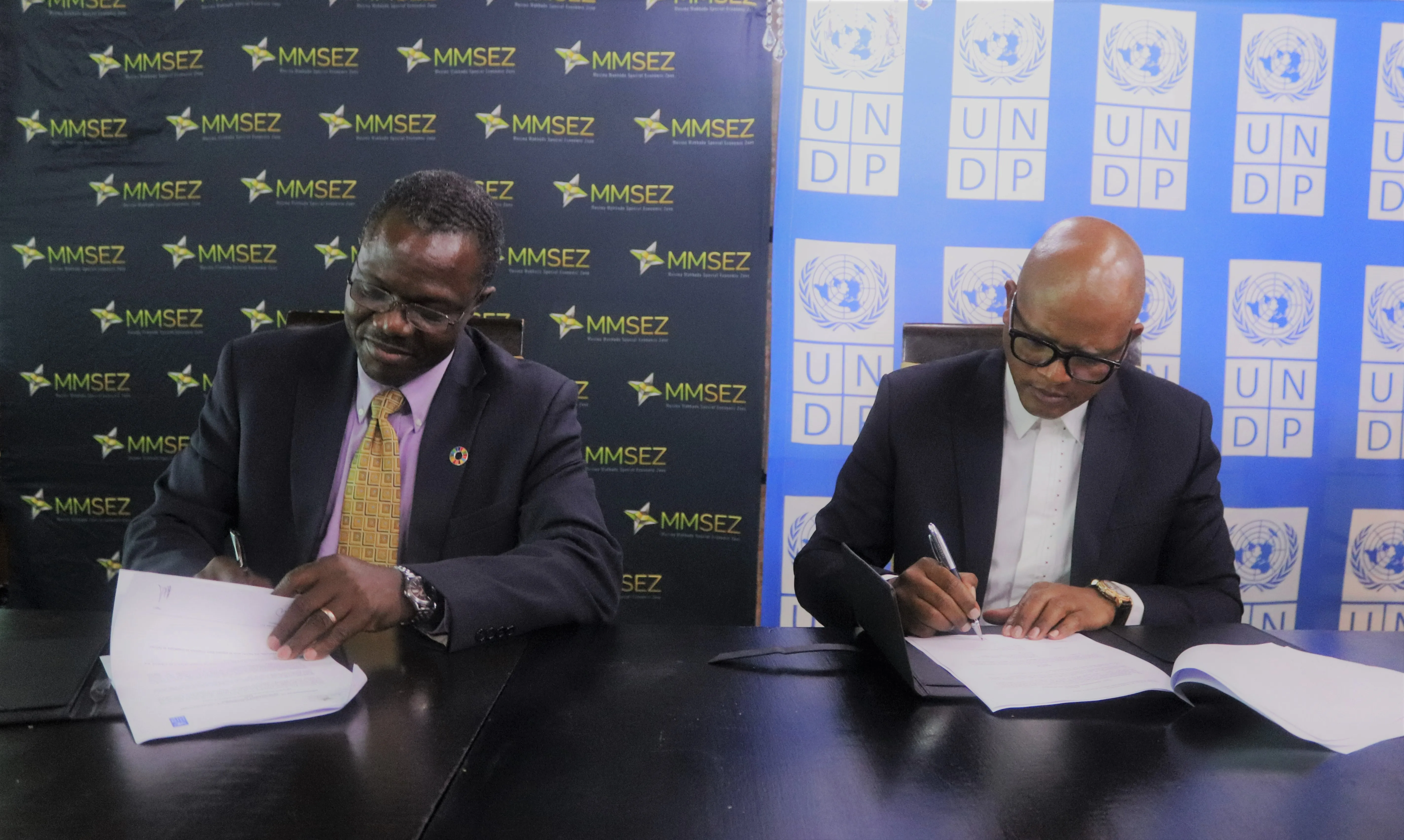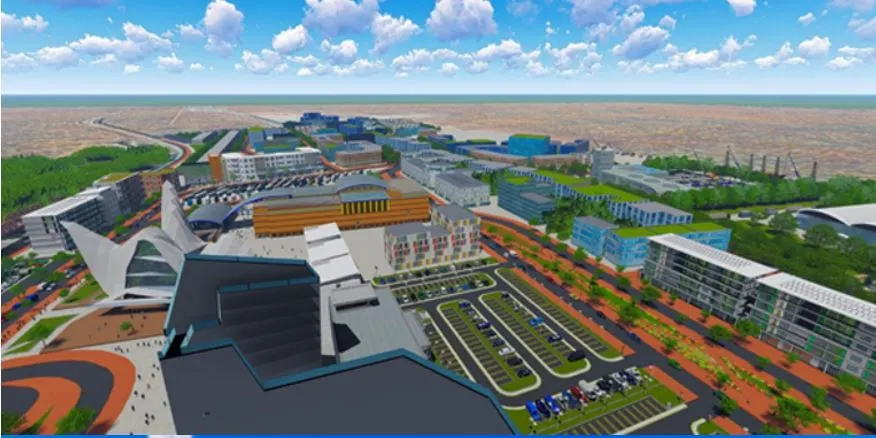REPUTATIONAL HARM RISK
UNDP moves to scrap support for ‘risky’ R165bn Limpopo heavy industry zone

A United Nations internal watchdog unit has advised its biggest development aid agency to scrap an agreement backing the development of a R165-billion heavy industry zone in Limpopo. Citing the risk of significant reputational harm to the United Nations Development Programme (UNDP), the agency’s New York-based Social and Environmental Compliance Unit (SECU) has recommended the immediate cancellation of an agreement signed two years ago to support the controversial Musina-Makhado Special Economic Zone (MMSEZ).
The project, driven by the state-owned Limpopo Economic Development Agency (LEDA), was initially touted as a R165-billion scheme supported by a consortium of Chinese investors. It would entail building a major 8,000ha heavy industry hub roughly halfway between the towns of Musina and Makhado next to the coal- and mineral-rich Soutpansberg region.

A map showing the boundaries of the proposed MMSEZ. (Photo: MMSEZ environmental impact report)
It would feature up to 20 new industrial projects clustered together in a single tax- and duty-free zone. This would include a new iron and steel plant, a ferrochrome plant, a chrome plating plant; an agro-chemical and petrochemical manufacturing plant; mineral beneficiation; a new Smart City and a logistics cluster projected to attract foreign direct investment. It would apparently create between 21,000 to 53,000 jobs.
However, the project has drawn strong criticism from several quarters for a variety of reasons – including concerns about massive water demands from heavy industry in a water-scarce region; soaring greenhouse gas emissions; pollution; degradation of eco-tourism in Limpopo; and frustrating the access rights of communities who won a land claim around the project site.
Several civil society groups are also contesting the legality of the project in three separate cases currently before courts in Pretoria and Polokwane.
Nevertheless, in March 2022, the South African office of the UNDP – the UN’s largest development aid agency, with offices in more than 170 countries – lent its official backing to the MMSEZ plan when it signed a non-binding memorandum of agreement (MOU). This promised technical backing and expertise along with other unspecified forms of support to foreign investors.
The wording of the MOU indicated that this was the foundation for a more formal partnership in the future, and internal correspondence suggested that the country office “was also considering how the funding for the action plan would be raised”.
Objections lodged

From left: Dr Ayodele Odusola, the UNDP’s former representative in South Africa, and Lehlogonolo Masoga, MMSEZ chief executive, sign the MOU in March 2022. (Photo: UNDP/MMSEZ press announcement)
The agreement was signed by the UNDP’s South Africa representative Dr Ayodele Odusola, who was re-deployed to the agency’s Harare office four months ago.
Now, following a formal objection lodged more than a year ago by social and environmental groups Living Limpopo and Earthlife Africa, the UNDP’s endorsement is set to be cancelled.
In a 29-page final draft investigation report, which came to light at the weekend, the SECU formally recommended that UNDP pull the plug on supporting such a “high risk” project as no due diligence was conducted, as required by UNDP policy.
“The fact that the signing of the MOU resulted in UNDP being publicly identified as a partner means that the mere existence of the signed MOU had significance for (the Limpopo Economic Development Agency). This in turn exposed UNDP to whatever reputational risks may arise from being associated with a company, whose project (pursuant to the applicable policies) the UNDP considers to be high risk.”
Hailing the SECU decision as a significant victory, Living Limpopo spokesperson Lauren Liebenberg said: “The MMSEZ is an environmental and economic Chernobyl, and we are gratified that our objections to its endorsement by the UNDP in this manner has been upheld. We look forward to entering into a constructive dialogue with the UNDP on the alternative, nature-based economic development plan Vhembe Biosphere Reserve for which Living Limpopo advocates.”
Killing the Holy Ghost: Inside the unlawful bid for environmental approval of the Musina-Makhado SEZ
Robert Krause, a researcher at the Centre for Applied Legal Studies, suggested that the Limpopo heavy industry cluster also posed “a grave threat” to communities’ livelihoods and their way of life, water security, biodiversity and the prevention of runaway climate change.
“The UNDP and all decision-makers now have a new opportunity to meaningfully consult communities and other stakeholders on how to chart a people-centred development path that brings much-needed broad-based prosperity while conserving this irreplaceable landscape.”
A spokesperson for the UNDP’s Pretoria office confirmed that the SECU report was received on February 21, stating: “We are reviewing the interim findings; we look forward to the final report and recommendations.
“UNDP’s Social and Environmental Standards (SES) are a mandatory requirement for all parts of the organisation – in all programmes and projects – as part of UNDP’s quality assurance and risk management process. The Social and Environmental Compliance Unit (SECU) was established to ensure accountability to individuals and communities we work with. It is important that their voices are heard, and gives UNDP the opportunity to respond to the issues that they raised.”
Senior MMSEZ officials, however, have not responded to requests for comment sent on Friday morning, February 23.
‘Using’ the UNDP

An artist’s impression of part of the proposed MMSEZ project in Limpopo. (Photo: MMSEZ website)
The SECU report notes that the Limpopo government agency sought a written agreement with UNDP “precisely because it believed that engaging with the [UNDP] would help it deal with the challenges that it faced in its relations with outside stakeholders, who were concerned about the potential adverse social and environmental impacts of the project”.
In other words, the Limpopo agency appeared to be “using” UNDP to help it resolve problems with local stakeholders opposed to the project, by listing the UN aid agency as a strategic partner.
“Given that one of UNDP’s strongest assets is its good name and high reputation, the potential costs of exposing itself to reputational risk without proper due diligence are considerable,” the SECU report warns.
SECU stressed that it had not investigated the merits or specific risks of the MMSEZ project. Instead, the eight-month investigation focused solely on whether its South African office had complied with all the applicable UNDP policies and procedures.
It notes that the UNDP has two distinctly different templates for entering into MOUs – one for the private sector and one for governments/state-owned entities. In the case of MMSEZ, the UN country office erroneously signed a less onerous government template.
“The private sector template has provisions dealing with publicity, the use of the UNDP emblem and reputational risk. Had the country office used the private sector template it would have been prompted to seek representations from [LEDA] to assure itself of certain facts before entering into the MOU.
Carbon emissions
“The potential “vast scale use of coal” was one of the many risks flagged by Living Limpopo and Earthlife Africa, who argued that the MMSEZ project was expected to generate nearly 1 billion tonnes of carbon dioxide equivalent emissions over the lifetime of the project – and would therefore consume between 10% to 24% of the country’s carbon emission budget.
This was disputed by the UNDP’s Odusola, who said in July 2022 that MMSEZ had provided assurances that it had “jettisoned” plans for a coal-fired power plant in favour of a renewable energy project.
How the Musina-Makhado SEZ will parch the people of Zimbabwe
The SECU report further notes that project documents make it clear that the Limpopo heavy industry plan would be very water-intensive, mainly drawing from the Limpopo River.
“The complainants are concerned that this water will go to the project at the expense of the resiliency of the Limpopo River basin system and all those who depend on it. In other words, they are worried that the project will take the water that they currently depend on for its own purposes, thereby threatening their ability to access enough water for their farms, households and other needs.”
A further risk factor involved potential human rights violations against the Mulambwane community, who were forcibly evicted from their land during the apartheid era.
“Following the advent of democracy in South Africa, the Mulambwane filed a land claim seeking to regain access to their land. Their claim was successful, and they were authorised to take possession of their land again. However, since their legal victory, they have not been able to reclaim their land. This land has now become part of the land that the state has designated for the MMSEZ, further complicating the resolution of this issue.”
As a result, the compliance unit now recommends that UNDP’s South African office should “withdraw” from the MOU.
It said that if LEDA wished to continue its relationship with the UNDP, the parties would need to prepare a new MOU using the correct private sector template, and the UNDP would also need to complete the necessary due diligence “including the necessary consultations with the appropriate offices in the UNDP hierarchy, before signing a new MOU”. DM

















 Become an Insider
Become an Insider
This putative scheme rang alarm bells from the day it was first announced.
The water and other serious environmental aspects aside-there was a slavering of lips with hands already reaching out for share of the gravy.
Hope it’s finally consigned to oblivion and the hungry hands put to shame!
Wrong agreement signed-yeah right!!
Shades of a bullet train from Musina to Cape Town!
The email title says million, the article says billion. Nou wat nou?
They can’t organise a taxi rank, so what was the likelihood of LP pulling this off? There would be (probably already is) an enormous fleet of new German SUVs in the hands of the corrupt and connected.
It didn’t read well from the start, years back
Just like the Apartheid NP’s decentralised industry programs, there was a lot of wastage of money and many white elephants created, and this includes the likes of Kouga, which has seen a lot of wastage of money. Like most themed schemes, including innovation hubs, these schemes are wrongly located and never turn out the way the designers planned.
The state has spent billions trying to re-own an steel mill, when it should never ever have sold Iscor in the first place. The international engineering companies and their BEE counterparts, like the Canadian company Hatch, laugh all the way to the bank as they are getting paid top dollar for designs and feasibility studies, that come to zero. It is wrongly conceived from the outset and a well seasoned professional can tell the state that off working on the back of a cigarette box.
This smacks of BEE/Corruption shenanigan’s.
Just Me : projects like this always go pear-shaped because government does something that the market would already have done if it made sense. Exact same as The Nats’ decentralisation. Even the tax incentives don’t work. If the only reason industry does something is because the NPV of the project relies on tax benefits, then taxpayers are subsidising shareholders.
ANC led development initiatives will automatically get, should and are getting, much greater scrutiny as guilt by association kicks in to our delinquent democracy. Due diligence is not a buzz phrase; it’s a process that protects from harm people, places, processes and products. Our government would do Well to note the impact of its own delinquency on aided development generally and the environment specifically in this instance. Of course the politicians involved will shake the dust off their feet and move on to the next corrupt money spinner. We get what we vote for and nobody in development trusts the SA ANC-led Gvt.
This scheme smells of corruption, fraud and misappropriation!
Reputational Harm meaning being connected to Grand Larceny.
Absolutely hilarious. All the supposed reasons for scrapping the project like harm to the environment and carbon emissions, to name just two. But the actual reason, not stated of course, is the realization that the money provided would disappear down the usual plug hole of corruption, cadre deployment, BEE, jobs for pals and family members. They must have been insane to even think about it in the first place.
Just another dodgy deal exposed; is there any end to the brazen “investment” schemes these conniving thieves put together with one objective in mind and that is opening the taps at the feeding trough. Thank goodness for decent, honest citizens in civil society organizations who expose the putrid rot time and time again.
A bit like the Petrosa Expose last night
Money for the cause, the cause being enrichment and greed
Good call. They would have built a few shacks and pit toilets and stole the rest.
I think it’s much more likely that they pulled out because they realised it would fail due to rent seeking and incompetence everything else the ANC touches. That ANC deployees are utterly incapable of doing anything beyond stealing a significant slice of every rand that passes by is now pretty common knowledge even among credulous lefty do gooders. I suspect the environmental angle is a convenient and politically correct excuse.
Exactly!
State owned – two words that should raise red flags.
Foreign funders are starting to wake up to the obvious corruption that will take place! The chickens are coming home to roost!
The United Nations is becoming more and more a not funny joke under the present director general. Terrorists in its Gaza aid organisation, signing off on projects like this one which will stink out South Africa without doing any impact studies, weeping and wailing about climate change while sponsoring international conferences with 3,000 delegates flown in at UN expense from the ends of the earth in jets burning two litres of kerosene a second…. Afraid to say calls from rich countries to boycott it are getting stronger.
Wise move by the UNDP. Anything involving the ANC run ‘state’ is highly like to be found wanting in everything from smoke and mirrors due diligence requirements through to deep seated corruption.
United Nothing, bad stewards of handling other peoples money/ donations. Does GAZA ring a bell. Incompetency in the land of the begging bowl. Pity so many polly ticks lining up….
Can this guys do ONE thing right? P.S. That was a rhetorical question…
Go to Garankoa – North of Pretoria……go see that attempt.
The reasons for the UN backing off have nothing to do with alleged corruption notwithstanding that it could have become a problem, the reasons are: fossil fuel based energy generation which the UN is patently against (the assurances given by the Limpopo government were vacuous and endangerment of a water resource with both human and environmental consequences. Even the Chinese backed off
This project would be a disaster for the Musina region which is already a drought prone region. The mining impact on the Limpopo river would have a knock-on affect on communities living alongside the river in Zimbabwe & Mozambique.
Now that Mbabula has shot his mouth off in Moscow, I think we are going to see more withdrawals from western based organisations on ‘technical’ grounds. Be careful what you wish for. I have yet to see Russia actually investing anything. Where are Russian vehicle, industrial, food processing or power plant contributions?
One question… Does the UNDP support racist the BEE policies of the ANC government?
Thank heavens for some good sense from an otherwise unexpected source.
Hopefully the promoters of this plan will be appropriately tainted.
I doubt it (that the promoters will be tainted).
Indeed, it was deliberate irony…
One question – Irrespective of the high potential for this to become a white elephant for several reasons, how would the massive, long-term power demands be met by Eskom?
This is our chickens coming home to roost! No one in the West will trust our ability to play by the rules after our recent behaviour! Being a member of BRICS and towing the Russian party line has damaged our ability to do business where it counts! We now have to rob our own banks to support our economy…..and thats possibly just the beginning of things yet to come. Dear oh dear!
100%
And I recon Iran going BRICS was the straw that broke the camels back.
Show me your friends and I’ll tell you who you are…
White farmers, several of whom had been on the land for five generations, were forcibly removed from their farms due to unsubstantiated land claims within the designated area. Subsequently, the government entered into a 25-year lease agreement with the new proprietors.
Oh this is too precious, of all the concerns the UNDP mentioned, not once did they mention all the absolute corruption, mismanagement, stealing and misappropriation of funds that is absolutely guaranteed with these bunch of mamparas in the African National Corruption party.
The UNDP is worried about ‘reputational damage’ while the ANC is nothing but one giant reputation wrecking ball, with myriad evidence to support how morally bankrupt, corrupt and inept they are, and still the UNDP put their name behind this looting fest. Really?!
Simply English excuses not to better the livelihoods of poor people in the country. The so called SECU did not even conduct a formal investigation into their “high risk” claims but merely assumes the rate of unemployment in SA will just disappear by protecting some reputation. People should not dare make recommendations if they cannot provide immediate solutions to the many challenges faced by the marginalized. Today many industries have been forced to close down because some “bandits” felt that we should be environmentally considerate even if they had no realistic plan to back own claims of the “Just Energy Transition”.
This is simply a sabotage of the highest note, only if few minority benefit from all this circus, and we have perpetual beggars on the streets with over unemployed Doctors, whilst sitting with dilapidated infrastructure and random deaths at many of these public hospitals, its just business as usual.
Those who support and stand in the progress of progress in this country, will one day live to regret it as this transition will come back to bite own pockets.